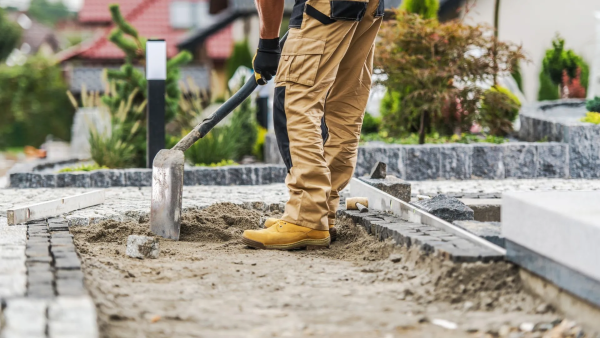Paving Contractor Revamps Major Highways for Smooth Travel
A paving contractor enhances major highways through resurfacing, safety upgrades, drainage planning, and efficient coordination, improving traffic flow, durability, and community connectivity while reducing long-term maintenance costs.
Indianapolis, IN, United States, 28th Nov 2025 – Major highways are the lifelines of transportation, and maintaining them requires skill, precision, and planning. A professional paving contractor plays a crucial role in revamping these roadways to ensure safer and smoother travel for millions of commuters. With a focus on quality materials and expert techniques, the work of a paving contractor not only improves driving comfort but also extends the lifespan of highways, reducing long-term maintenance costs. By addressing cracks, potholes, and worn surfaces, these contractors transform outdated roadways into reliable routes capable of handling heavy traffic. The expertise of a paving contractor ensures that transportation networks remain efficient, helping communities stay connected and supporting economic growth through improved infrastructure.
Roadway Resurfacing and Modernization
A paving contractor specializes in resurfacing worn highways to restore structural integrity and driving comfort. Modernization involves replacing damaged asphalt, filling cracks, and leveling uneven areas to create a uniform surface. By using high-quality materials and precise techniques, the contractor ensures that the highway withstands heavy traffic and extreme weather conditions. Roadway resurfacing also reduces the likelihood of potholes and deterioration, contributing to long-term safety. This proactive approach allows communities to maintain smooth, efficient transportation networks while minimizing frequent maintenance disruptions, ensuring drivers experience a reliable and enjoyable journey along every stretch of the upgraded highway.
Traffic Flow Enhancement
Improving traffic flow is a critical outcome of a paving contractor’s highway projects. By eliminating uneven surfaces and upgrading lane markings, vehicles can move more smoothly and safely. Enhanced road design reduces congestion and prevents accidents caused by sudden bumps or potholes. A contractor also optimizes highway shoulders, ramps, and entry points, which allows for better vehicle merging and exit strategies. These improvements contribute to a more organized traffic system that saves commuters time, reduces vehicle wear and tear, and supports commercial transport efficiency.

Choosing High-Quality Materials
A paving contractor selects durable materials that withstand heavy traffic, weather changes, and chemical exposure. Using high-quality asphalt and reinforced aggregates ensures the road surface remains strong and resilient, reducing wear and extending highway lifespan for years of reliable travel.
Layered Construction Techniques
Implementing layered asphalt and reinforced bases strengthens highways against stress from vehicles and environmental factors. This construction method distributes weight efficiently, prevents surface cracking, and ensures that highways maintain smoothness and functionality, providing consistent driving conditions for commuters over the long term.
Proper Drainage Management
Effective drainage planning prevents water accumulation that can weaken pavement and cause potholes. A paving contractor designs slopes, drains, and runoff systems to channel water safely away from roads, protecting surfaces from erosion and extending the durability of highways.
Addressing Temperature Fluctuations
Highways face expansion and contraction due to extreme temperature changes. Contractors use materials and construction strategies that accommodate these shifts, preventing cracks and surface deterioration, which ensures smoother, safer travel and lowers maintenance requirements for municipal authorities.
Reducing Long-Term Maintenance Costs
Focusing on durability minimizes frequent repairs and long-term expenses. By using resilient materials, proper construction methods, and strategic planning, a paving contractor ensures highways remain functional and safe, benefiting both travelers and communities with efficient, cost-effective infrastructure.
Long-Term Durability Planning
A paving contractor focuses on long-term durability when revamping highways. This involves selecting materials that resist heavy loads, temperature fluctuations, and chemical wear from vehicles. Advanced construction techniques, such as layered asphalt and reinforced bases, enhance the longevity of road surfaces. Strategic planning also includes drainage management and slope adjustments to prevent water accumulation, which can weaken pavement over time. By prioritizing durability, the contractor reduces future repair costs and ensures consistent travel quality. Travelers benefit from highways that remain reliable for years, while municipalities save on ongoing maintenance, demonstrating the contractor’s role in creating resilient transportation infrastructure.
Safety Upgrades and Compliance
Highway revamps led by a paving contractor often include critical safety improvements. Installing reflective lane markings, rumble strips, and proper signage enhances driver awareness, especially at night or during adverse weather conditions. The contractor ensures that all upgrades meet government standards and safety regulations, preventing accidents and liability issues. Guardrails, medians, and improved curves are strategically implemented to protect motorists. These safety-focused enhancements demonstrate the contractor’s commitment to public well-being, making highways not only smoother but also significantly safer. By combining construction expertise with regulatory compliance, a paving contractor delivers infrastructure that prioritizes human life alongside efficiency.
Environmental and Sustainable Considerations
Sustainable practices are increasingly incorporated into highway projects handled by a paving contractor. Recycled asphalt materials, energy-efficient machinery, and proper waste management reduce the environmental footprint of construction. Innovative techniques, such as permeable pavement, allow water to drain naturally, preventing flooding and erosion. A contractor may also integrate noise-reducing surfaces in high-traffic areas to improve surrounding communities’ quality of life. By considering environmental impacts, the paving contractor ensures that highway improvements are not only functional but also responsible, supporting long-term ecological balance while maintaining infrastructure performance for daily travelers.
Large-Scale Project Coordination
Coordinating major highway renovations requires a paving contractor to manage multiple teams, equipment, and schedules efficiently. From planning detours to sourcing materials, the contractor oversees each stage of construction to minimize disruptions for motorists. Logistics include traffic management, safety monitoring, and timely completion of each segment. Effective coordination ensures that work progresses smoothly while maintaining high-quality standards. By handling complex projects with precision, a paving contractor allows communities to benefit from upgraded highways without prolonged inconveniences, demonstrating the critical role of organization and expertise in large-scale transportation infrastructure improvements.
Economic and Community Impact
Highway improvements completed by a paving contractor have far-reaching economic and community benefits. Smooth, reliable roads facilitate commerce by reducing travel delays and vehicle maintenance costs. Communities experience safer commutes and better connectivity, enhancing quality of life. Infrastructure upgrades attract investment and can stimulate local development by providing accessible transportation routes. The contractor’s work, therefore, extends beyond pavement—it supports regional growth, trade efficiency, and everyday convenience. By revamping major highways, a paving contractor contributes to a sustainable transportation network that strengthens both economic activity and public well-being, leaving a lasting positive impact on the community.
Managing Multiple Teams Efficiently
A paving contractor coordinates various teams, including crews, engineers, and equipment operators, to ensure tasks progress smoothly. Clear communication and defined roles allow simultaneous work on different project areas, keeping large-scale highway renovations on schedule and maintaining consistent quality.
Strategic Equipment and Resource Planning
Effective project coordination involves allocating machinery, materials, and resources where needed most. A paving contractor monitors equipment usage and supply deliveries to prevent delays, ensuring that every stage of construction is properly supported and that highway upgrades proceed without interruptions.
Traffic Flow and Detour Management
Maintaining safe and efficient traffic during highway renovations is critical. Contractors plan detours, lane closures, and signage to minimize disruptions for commuters, ensuring safety for both motorists and workers while maintaining steady progress on large-scale paving projects.
Safety Monitoring and Compliance
A paving contractor implements strict safety protocols throughout highway projects. Regular inspections, worker training, and hazard management ensure compliance with regulations, protecting teams and the public while reinforcing high standards for construction quality and project reliability.
Timely Project Completion
Coordinating schedules and milestones ensures highway projects finish on time. A paving contractor monitors progress, resolves issues quickly, and maintains workflow efficiency, delivering upgraded roads promptly, reducing community inconvenience, and demonstrating expertise in managing complex infrastructure projects.
Conclusion
Revamping major highways is essential for safe, efficient travel, and a skilled paving contractor ensures that roadways are durable, smooth, and reliable. These improvements enhance traffic flow, reduce vehicle wear, and provide communities with dependable infrastructure that supports everyday commuting and economic activity.
For businesses and residents in Indianapolis, Indiana, Five Star Paving delivers expert highway and paving services tailored to the city’s needs. Reach out to our team at 317-339-2107 to learn how we can improve roadways and enhance travel safety. Trust Five Star Paving for professional, high-quality results across the region.
Five Star Paving
1350 w southport rd suite 262
317-339-2107
https://5starpavingservice.com/
Company Details
Organization: Five Star Paving
Contact Person: Five Star Paving
Website: https://5starpavingservice.com/
Email: Send Email
Contact Number: +13173392107
Address: 1350 W Southport Rd suit 262, Indianapolis, IN 46217
City: Indianapolis
State: IN
Country: United States
Release Id: 28112538070

